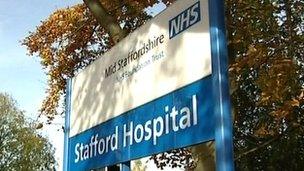After Stafford, do we need a new breed of watchdogs?
- Published
- comments
"This must never happen again."
It is what we all say after any catastrophic event and we have been chorusing it again and again in the days since publication of the Francis Report on Stafford Hospital last week.
But how confident should we be, especially now that 14 hospitals in England are under investigation because of higher than expected death rates over the past two years?
Could another Stafford be lurking on the list?

Mid Staffordshire NHS Foundation Trust said big improvements had been made since 2008
Put yourselves in the shoes of patients awaiting treatment in the three Midlands hospitals to be examined: George Eliot in Nuneaton, Queen's Hospital in Burton-upon-Trent and the Dudley Group of hospitals.
The chief executive of the Dudley Group NHS Foundation Trust, Paula Clark, told us: "We welcome the review as we believe it will give further reassurance around the safety and quality of our services.
"Current independent analyses show the trust is not an outlier and is within the expected range. The trust is committed to ensuring the best possible care of all patients."
One recommendation which arose three years ago from the first of Robert Francis's two inquiries is Healthwatch.
The government has since written it into the Health and Social Care Act. From April this year there will be one of these new-style watchdogs in every metropolitan, shire county or unitary area.
They will be independent, able to employ their own staff and there will be a strong emphasis on volunteer membership representing the authentic voice of the people.
Their remit will be to investigate the concerns of health and care service users, with statutory powers to enter hospitals, care centres, GPs surgeries and dental practices to see for themselves how they are working.
They will replace the soon-to-be-defunct Local Involvement Networks (LINks) with wider powers aimed at preventing the sort of failure of local scrutiny which we saw in Stafford.
Robin Morrison, chair of Engaging Communities Staffordshire who will be responsible for Healthwatch in the county, said: "The people of Staffordshire deserve a powerful voice and this is exactly what we will give them."
But the chief executive in charge of the Midlands' biggest super-hospital, Dame Julie Moore of University Hospitals Birmingham, told last weekend's Sunday Politics programme that Healthwatch would succeed only if it had credibility and involved people with experience in delivering health services.
To get the inside track on how the promised culture change is being delivered in the NHS, BBC Stoke's Political Reporter Phil McCann has been granted access to film in the Queen's Hospital in Burton-upon-Trent.
And you will be able to see his report for yourself on this weekend's Sunday Politics Midlands from 11.00 on BBC One this Sunday 17 February 2013